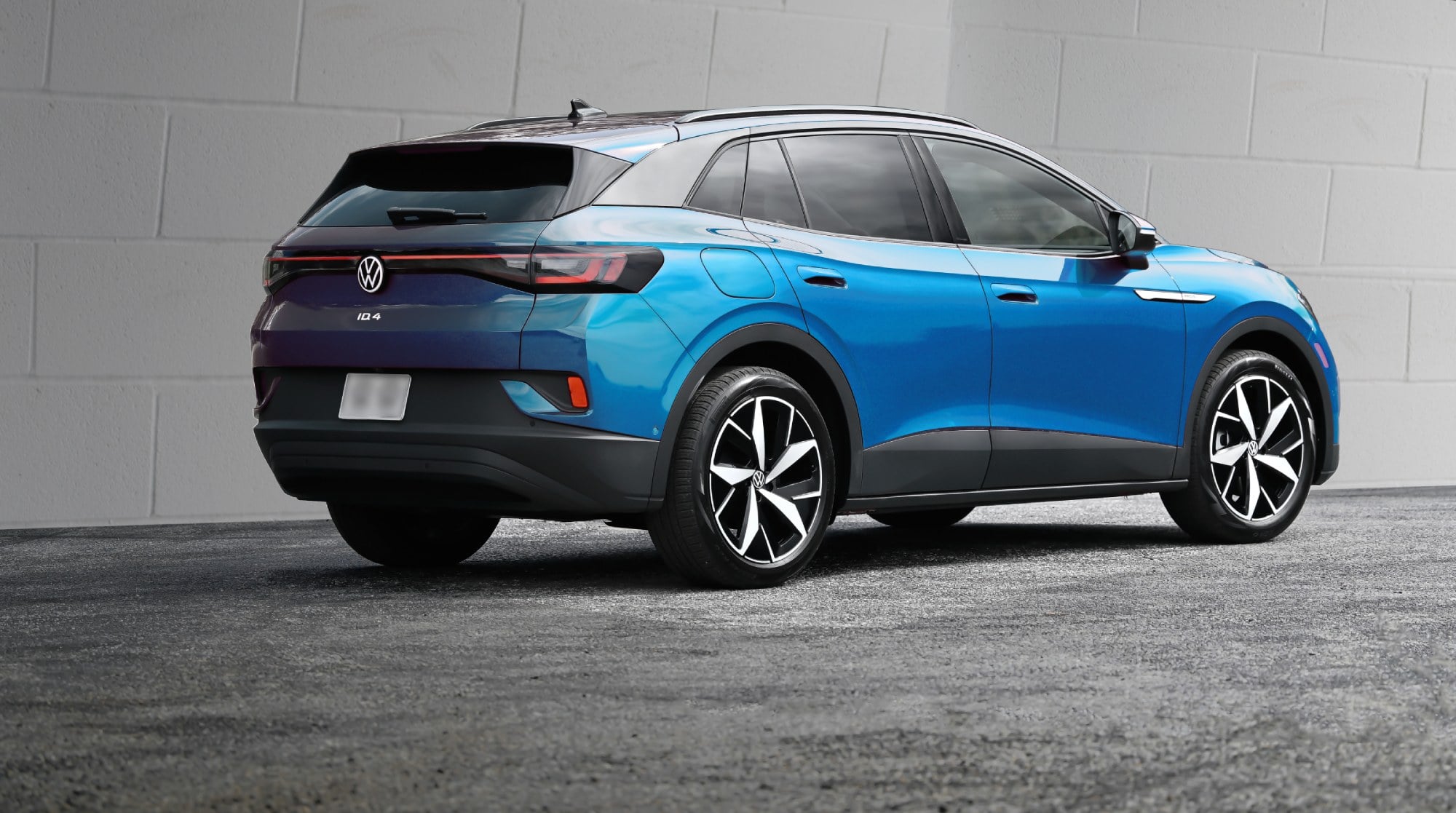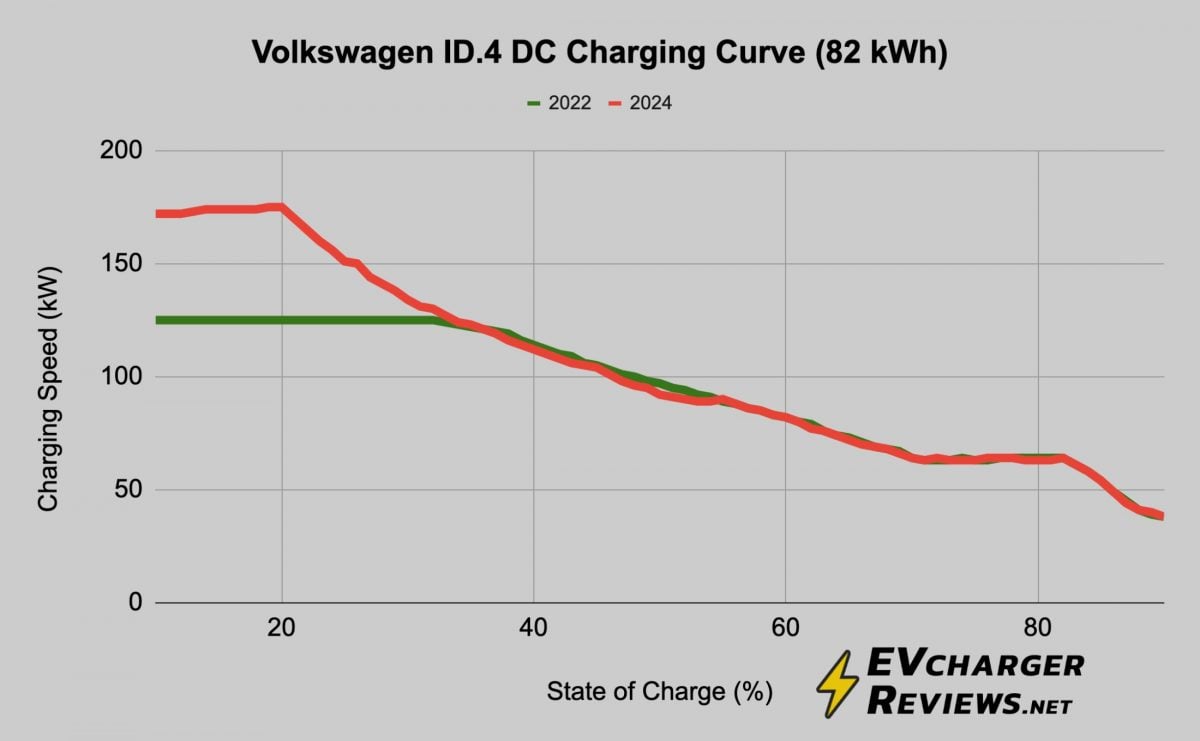EVchargerReviews is supported by our readers. We may earn commissions from links on this page. Why trust us?
Best Home EV Chargers for Volkswagen ID.4
The Volkswagen ID.4 is the brand’s mass-market electric crossover SUV based on the MEB platform. The ID.4 is built from the ground up as a battery-electric vehicle.
VW is now producing ID.4s from the company’s plant in Chattanooga, Tennessee for the North American market. This means shorter wait times and more affordable prices. The US-built ID.4 has either a 62 kWh or 82 kWh battery pack. For MY2024, the ID.4 has a new more powerful rear motor.
The ID.4 uses an industry-standard J1772 / CCS connector combo for charging at home and on the road. US-spec cars can charge at up to 11 kW at home on Level 2. Full charging at home is expected to take between 7.5 and 11.5 hours depending on the charging station’s power.
VW ID.4 Charging Fast Facts
| EV Charging Connector | J1772 / CCS |
| Battery Capacity | 62 – 82 kWh |
| Level 2 Charging Power | 7 – 11 kW |
| Level 2 Max Amps | 32 – 48 A |
| Level 2 [20-80%] Charge Time | ~5 Hours |
| Level 3 Peak Power | 125 kW |
ChargePoint Home Flex (50 Amp)
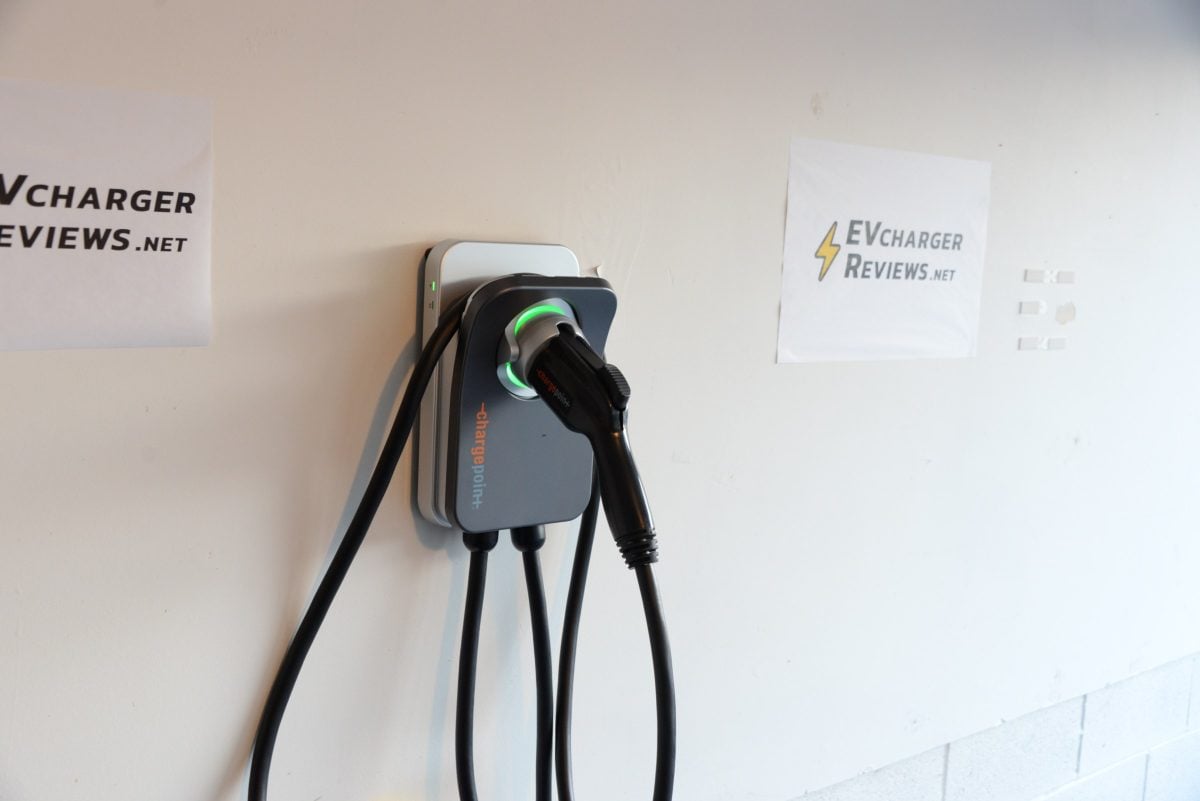
ChargePoint is best known for its Level 2 and Level 3 public charging network in the USA, but ChargePoint also offers one of the best home charging stations on the market. The Home Flex is our premium choice for ID.4 owners. It can provide up to 50 amps of power to your electric vehicle, more than enough for the ID.4. The ChargePoint app enables you to schedule charging sessions during periods of low electricity costs and even sends reminders in case you forget to plug in your EV.
The Home Flex is worth the premium because the cord stays soft and easy to manage in cold weather and the same app can be used to access ChargePoint’s public charging network.
Specs
- Amperage: Up to 50 amps
- EV Connector: J1772 or NACS
- Home Connection: NEMA 14-50, 6-50, or hardwire
- Cord Length: 23 feet
- Weatherproofing: NEMA 3R
- Networking: Wi-Fi + BT
- App Control: Yes
- Warranty: 3 years
Pros
- High-quality cord material
- Many plug-in installation options
- Alexa/Google Home integration
- EnergyStar certification
Cons
- Only one Home Flex can be paired to an account
- The product is heavily dependent on the app
EVIQO Level 2 EV Charger (48 Amp)
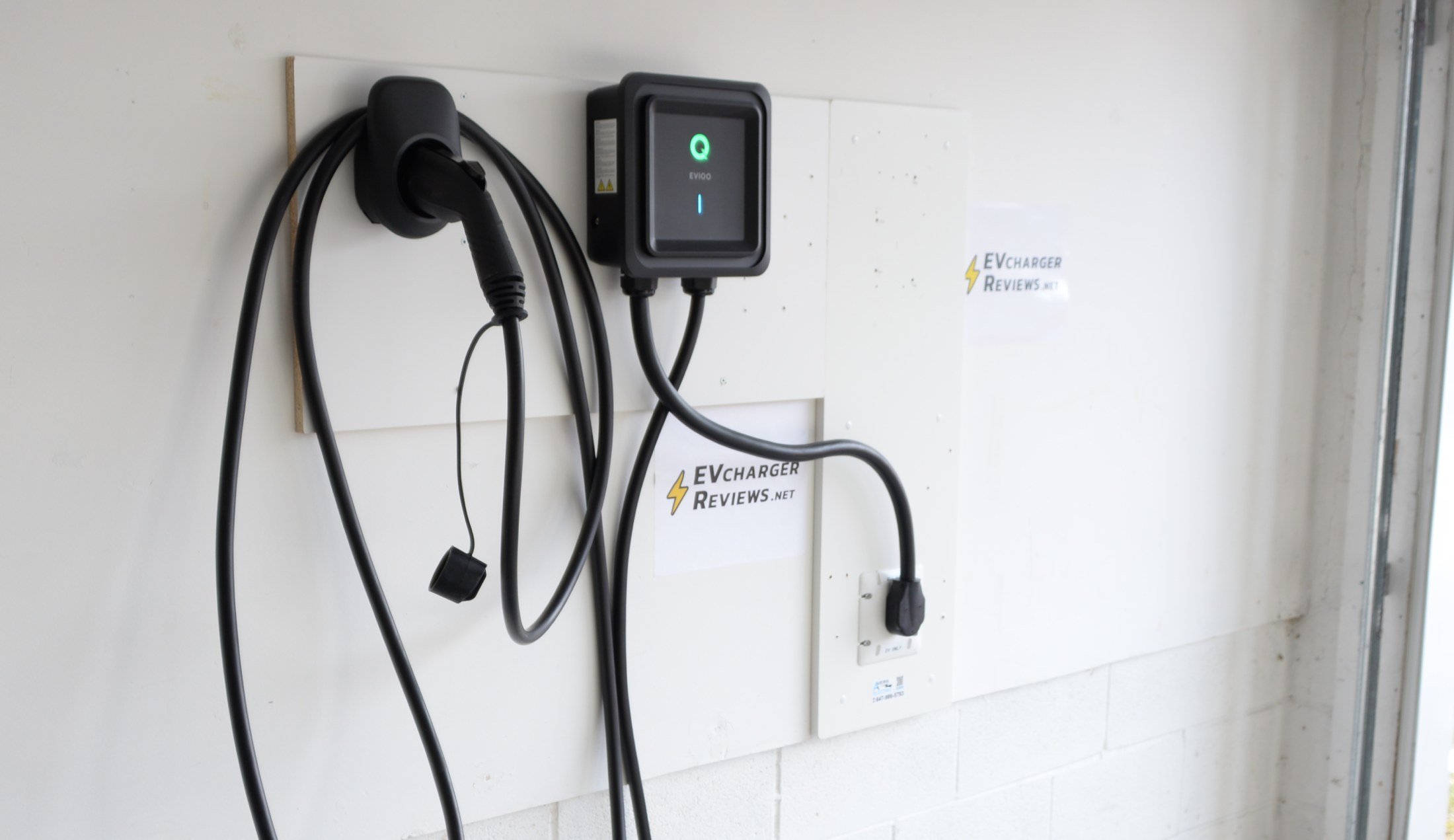
EVIQO is a newer company that got a lot of things right on their first product. The hardware is great all around, with an excellent J1772 connector, and durable build quality. Their mobile app is some of the best in the industry, it supports notifications, live stats, and very detailed charging cost estimates. With 48 amp charging, owners of the ID.4 can charge at maximum speed.
The design stands out from the rest, and the built quality is very good at this price point. We wish cord management was integrated into the main unit rather than an external holster, but we’re kind of nitpicking.
Specs
- Amperage: Up to 48 amps
- EV Connector: J1772
- Home Connection: NEMA 14-50 or hardwire
- Cord Length: 25 feet
- Cord Thickness: 18.5 mm
- Cord Gauge: AWG 9
- Weatherproofing:
NEMA 4 - Networking: Wi-Fi + BT
- App Control: Yes
- Warranty: 2 years
Pros
- Long input and output cables
- Great app with scheduling and cost reporting
- Metal J1772 clasp and release tab
Cons
- The cord is durable but the thickness can make it more difficult to handle
- The J1772 holster makes the cord stick out from the wall
Shell Recharge Portable Charger (40 Amp)
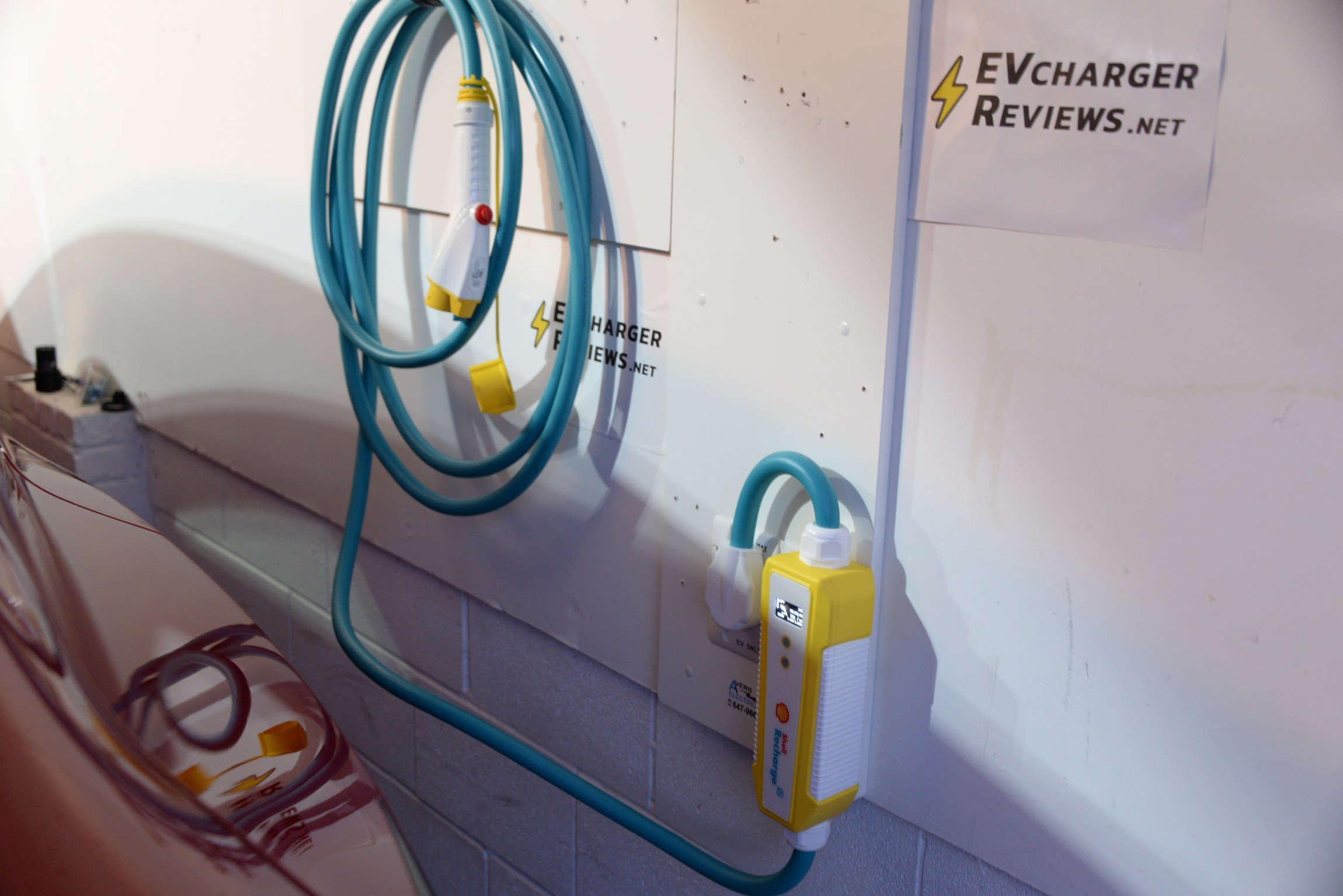
Are you looking for a portable EV charger for the ID.4? The 40-amp Shell Recharge is worth considering as a reliable and cost-effective option from a major brand. The 25-foot long charging cord connects to any NEMA 14-50 outlet (but it’s also 120v compatible with an adapter), and can charge any EV at up to 9.6 kW.
We loved the bright color scheme and included a carrying case. Performance at 40 amps was solid, without any thermal throttling issues. The LCD display was also helpful for monitoring energy consumption and other charging session metrics. Our only major complaint was a lack of included cable management accessories.
Specs
- Amperage: Up to 40 amps
- EV Connector: J1772
- Home Connection: NEMA 14-50
- Cord Length: 25 feet
- Cord Thickness: 21 mm
- Cord Gauge: AWG 8
- Weatherproofing:
IP66 - Networking: No
- App Control: No
- Warranty: 1 year
Pros
- Good 40-amp charger for the price
- Comes with a carrying case
- LCD Display with stats
Cons
- Lack of cable management
- A bit heavy for a portable unit
Wallbox Pulsar Plus (40 and 48 Amp)
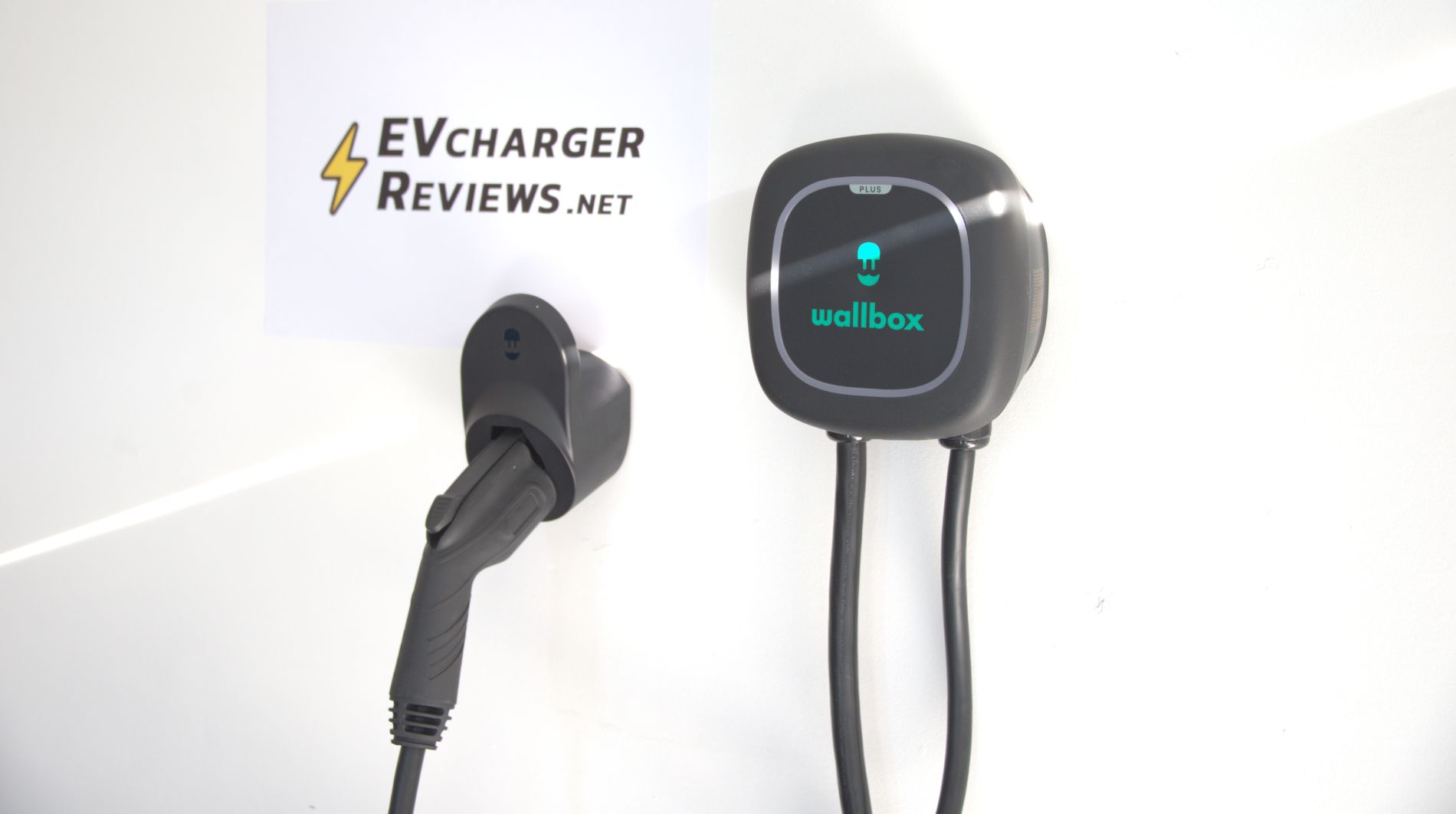
The Wallbox Pulsar Plus is our top pick for a charger with a compact and attractive design at just 7.8″ x 7.9″ x 3.9″ in dimensions.
Available in 40 and 48-amp versions, the Pulsar Plus can charge up to 8 times faster than Level 1 (110v) charging. The Wallbox unit features a 25-foot-long cable, the maximum allowed length. The 48 amp version of the Pulsar Plus is able to deliver up to 11.5 kW of power, cutting down charge times to just a few hours rather than overnight. This is a great choice for VW ID.4 owners looking to take advantage of the full 11 kW charging capability.
Wallbox also works great for households with multiple EVs that need to be charged simultaneously. Two or more Wallbox chargers on the same circuit can communicate with each other and balance the available household power between chargers.
Specs
- Amperage: 40 and 48 amp versions
- EV Connector: J1772
- Home Connection: NEMA 14-50 or hardwire
- Cord Length: 25 feet
- Weatherproofing: NEMA 4
- Networking: Wi-Fi + BT
- App Control: Yes
- Warranty: 3 years
Pros
- Compact, attractive design
- Reputable brand
- Durable J1772 connector
Cons
- The external cord holster design could be better
Grizzl-E Level 2 EV Charger (40 Amp)
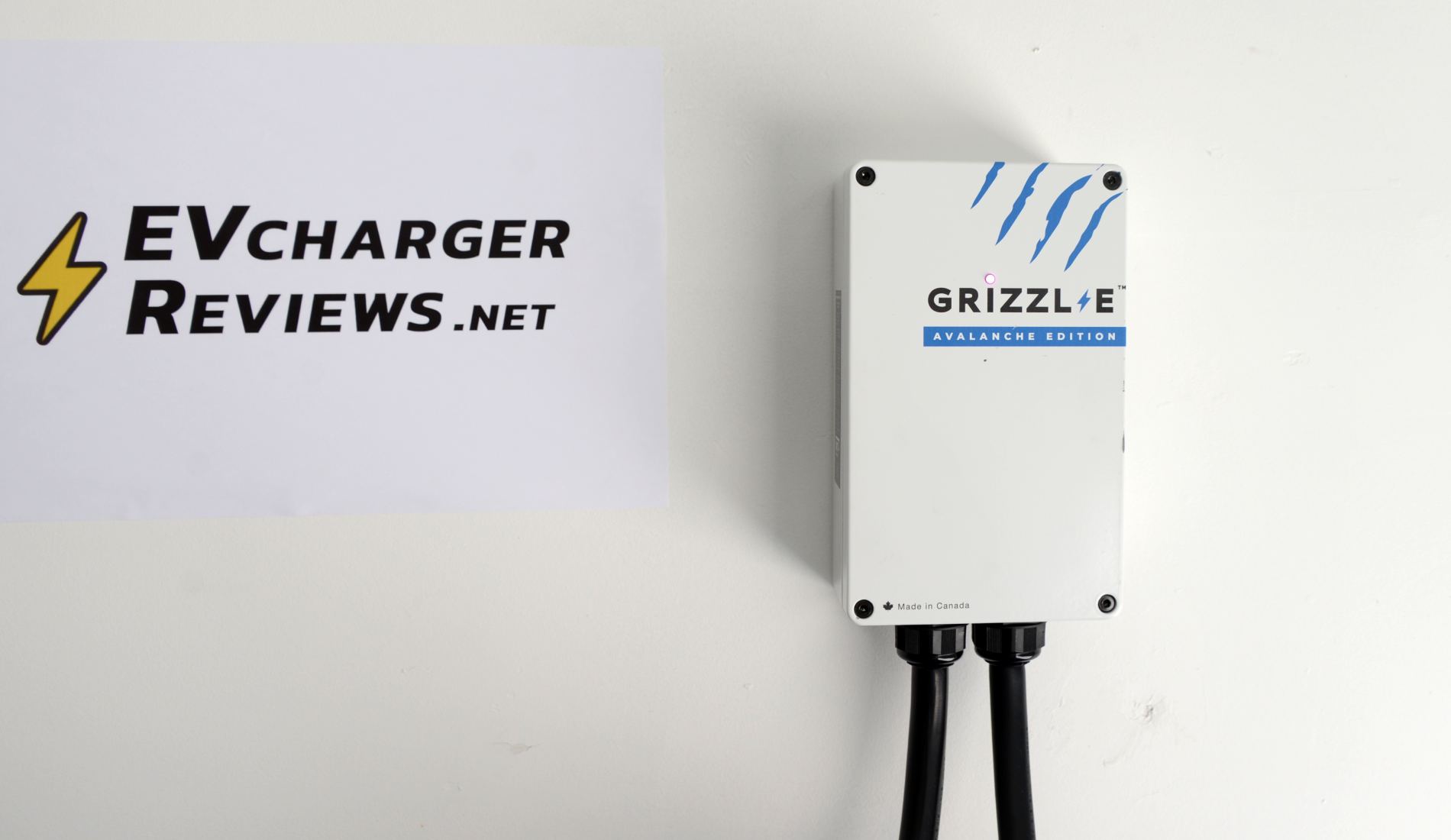
The Level 2 home charger from Grizzl-E is a compelling option for ID.4 owners looking for durability and value. It is a simple utilitarian design metal box with an LED indicator light and heavy-duty construction. Their basic version of the Grizzl-E has no screens or wifi connectivity options, just an industrial box with 40 amps of power delivery, which should translate to about 9 kW usable charging speed. Hardware dip switches inside the unit can be used to set lower amp loads for use on lower-power electric circuits.
Grizzl-E is based in Canada, so their products are designed to perform in extreme weather conditions. The operating temperature range is between -22F to 122F for outdoor usage.
This charger is available with either NEMA 14-50 or NEMA 06-50 wall connectors (check the SKU when ordering), and all variants can be hardwired by an electrician.
Specs
- Amperage: Up to 40 amps
- EV Connector: J1772
- Home Connection: NEMA 14-50, or hardwire
- Cord Length: 24 feet
- Weatherproofing:
NEMA 4 - Networking: No
- App Control: No
- Warranty: 3 years
Pros
- Durable construction
- Heavy-duty charging cable, suitable for extreme climates
- Value
Cons
- No smart features or app control
- Plastic external cord holster
Emporia Smart Level 2 EV Charger (48 Amp)
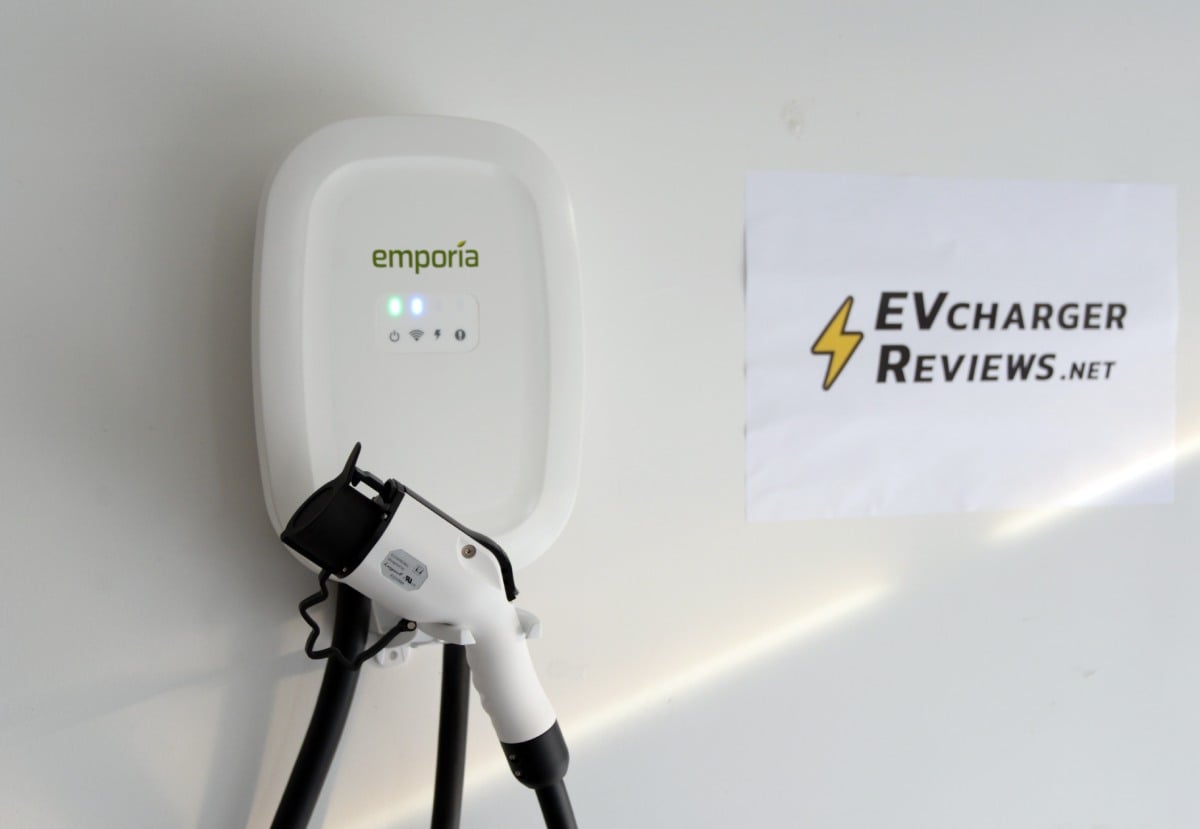
The Emporia home EV charger is easy to recommend if you already have other Emporia energy products in your home, as the app can control a variety of Emporia hardware. But this charging station is a compelling product by itself too. While cheaper than many competitors on the market, Emporia does not cut corners where it matters most.
We really liked the high power output (48 amps hardwired, 40 amps over NEMA 14-50), and the highly durable single-piece metal charge cord holder. Most competing brands include a cheap plastic cord holder in the box. Installation and app configuration were relatively easy as well.
Specs
- Amperage: Up to 48 amps
- EV Connector: J1772
- Home Connection: NEMA 14-50 or hardwire
- Cord Length: 24 feet
- Weatherproofing:
NEMA 4 - Networking: Yes
- App Control: Yes
- Warranty: 3 years
Pros
- Lower cost than competitors
- Emporia app connectivity and scheduling
- High-quality metal charge plug holder
Cons
- The charge cord is shorter than the competition
- The charger enclosure box is made from plastic
Frequently Asked Questions about charging the Volkswagen ID.4
Can I charge my ID.4 at a Tesla Supercharger?
Supercharger access is expected to arrive to VW vehicles around June 2025. A NAC-to-CCS adapter may be required depending on your model.
What charging cable comes with the VW ID.4?
The VW ID.4 comes with a Level 1 (110v) charging cable. This is only good for adding about 3 miles of range to the car per hour. So if you drive your ID.4 more than 20-30 miles per day, you will definitely benefit from installing a home Level 2 EV charger.
Does the VW ID.4 have a heat pump?
US spec ID.4s do not have heat pumps, an electric resistance heater element is used instead to keep the cabin warm. But Canadian spec cars have it as standard equipment, because of harsher climates. (But the ID.4 is also a lot more expensive in Canada)
How fast can the ID.4 charge?
ID.4s with a smaller battery can charge at 7.2 kW on level 2 at home and 110 kW at public fast chargers. The cars with the larger battery can charge at 11 kW at home, and up to 125 kW on level 3.
Should I charge my ID.4 to 100%?
VW recommends charging up to 80% for day-to-day driving and only charging up to 100% just immediately before taking a longer trip. It is perfectly fine to use the entire battery capacity of any EV, as long as the battery does not spend prolonged amounts of time near 0% or 100% state of charge. This article has more in-depth information about battery maintenance.
Where is the charging port on the Volkswagen ID.4?
The charging plug is located in the rear right corner of the vehicle. The same as fuel doors on contemporary VW gas cars.
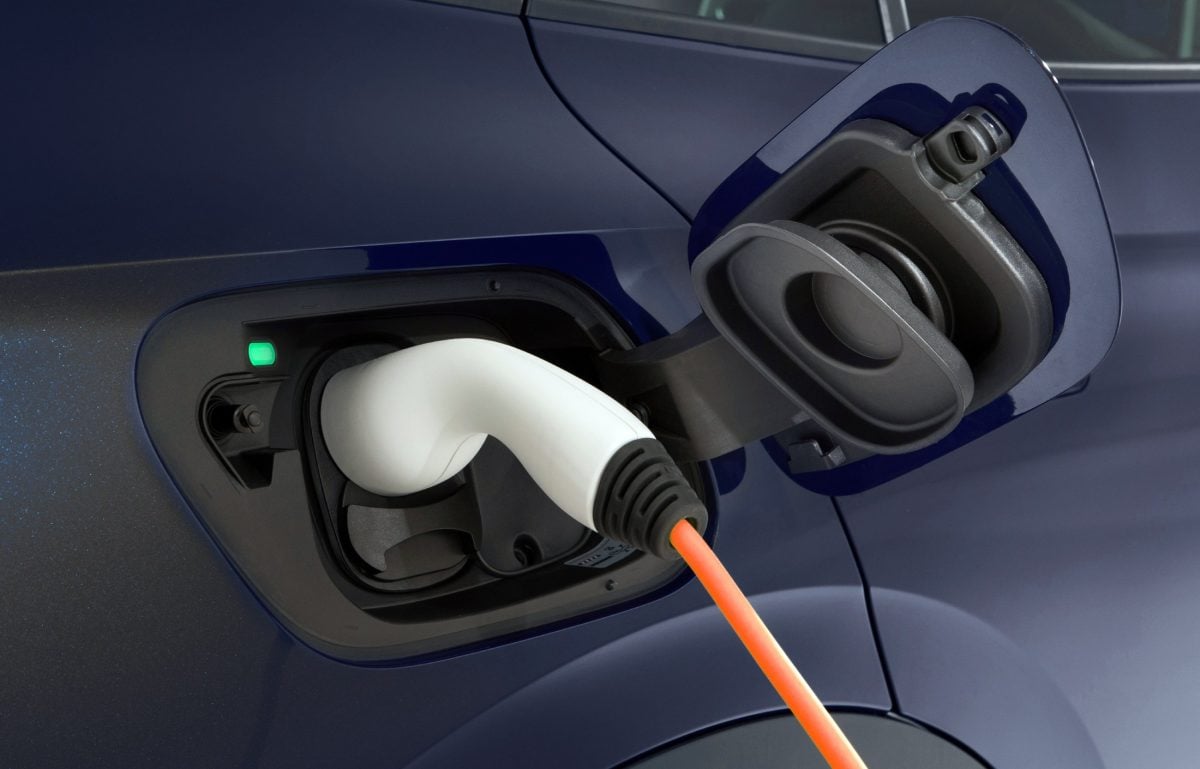
EVchargerReviews.net is a reliable source of information on home charging stations because we go beyond research. We get the products into our garage and test each home charging station for at least two weeks before coming to a recommendation.


